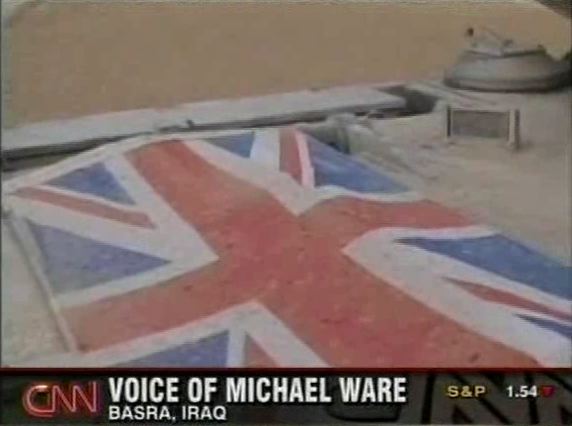NR: With the Brits in Basra

Click photo to play
Length: 3:59
TONY HARRIS: CNN's Michael Ware is on the line with us right now. He's embedded with British troops in Basra. Never know, when one of our reporters is in an embed, when we'll get an opportunity to talk to them. Michael is on the line right now. We want to take that opportunity.
Michael, good to talk to you.
I want to come to you with the story that's in the news today, Britain's army chief talking about the Iraq war. At one point, the story was, is that he was suggesting that it was time to get out of Iraq or risk catastrophic consequences, and then there was a different story, some backtracking, it seems. But what I'm asking you is, is what is reflected in these statements back and forth about the frustration that's being felt, perhaps, by these soldiers on the ground?
MICHAEL WARE, CNN CORRESPONDENT: Well, the comments that we've heard from General Sir Richard Dannatt, to a large degree, reflect the views of commanders here on the ground. Indeed, just days before the general made this statement, a British commander in the field on the Iranian border said precisely the same thing, that the presence of his troops in the area where he operated had led to increased attacks, so he shifted his troops.
So there is a great debate right now within British forces about this very thing, and I think the general is very much reflecting the views of his troops and the commanders on the ground. What the Brits are looking to do is find the right balance between staying here and contributing to the security environment, and overstaying and leading to the deterioration of the security environment.
HARRIS: And, Michael, you're in Basra now, in the Basra area. When we think about the English troops there and the British troop there in Basra, that is an area we think of as being relatively safe, certainly when compared to the situation in Baghdad. But give us a sense of what the situation is like in and around Basra.
WARE: Well, Basra still remains a hostile environment for British troops. It's not simple or an easy thing for them to do to move about this city or its surrounds. Indeed, there's daily indirect fire or mortar or rocket attacks. There are small arms attacks.
Indeed, our cameraman this afternoon was on a patrol where a rocket-propelled grenade was fired at his vehicle. So this is in no means a simple environment for British troops to operate in. It's very, very complex, and very much dominated by the Shia militias, which U.S. and British intelligence suggest have, to varying degrees, support from neighboring Iran.
HARRIS: And, Michael one last question, when you talk to these commanders, how do they describe the mission?
WARE: Their mission is one of nation-building. They're trying to get the Iraqis to lead themselves, to stand up and find their own solutions. So they're trying to build the Iraqi security forces and they're trying to build local governments here in southern Iraq. The problem is, the militias and the Islamic parties that represent them. According to locals and according to many intelligence officials, the government and many of these security forces are heavily penetrated by or dominated by some of these militias.
So it's a very, very complex environment. The Brits are trying to stand up a government, but they can't necessarily rely on the members of these governments to actually be their allies and true partners.
HARRIS: CNN's Michael Ware, embedded with British troops in the southern Iraqi city of Basra.
Michael, thank you.
